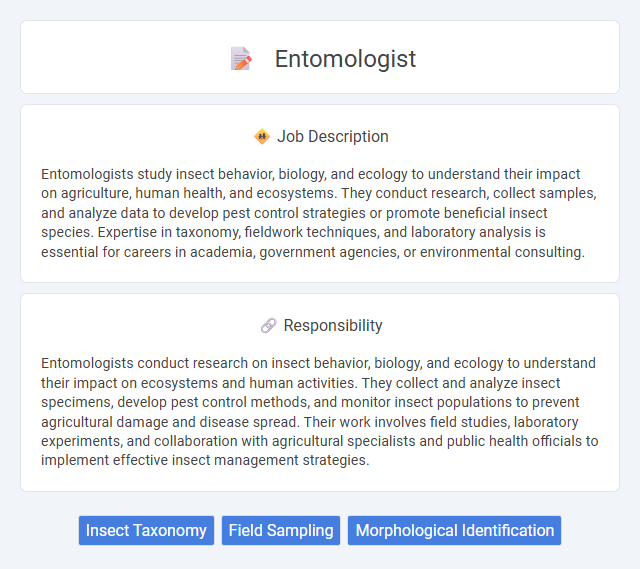
Entomologists study insect behavior, biology, and ecology to understand their impact on agriculture, human health, and ecosystems. They conduct research, collect samples, and analyze data to develop pest control strategies or promote beneficial insect species. Expertise in taxonomy, fieldwork techniques, and laboratory analysis is essential for careers in academia, government agencies, or environmental consulting.
Individuals with a strong interest in insects and a passion for biological research are likely to find a career as an entomologist suitable. Those who enjoy fieldwork, laboratory experiments, and detailed observation may experience greater job satisfaction. However, people who prefer minimal outdoor activity or dislike meticulous data analysis might find this profession less fitting.
Qualification
A career as an entomologist requires a minimum of a bachelor's degree in entomology, biology, or a related field, with advanced positions often demanding a master's or Ph.D. Specialized knowledge in insect behavior, ecology, and taxonomy is essential for conducting research and addressing pest control issues. Proficiency in laboratory techniques, fieldwork, and data analysis is critical for studying insect populations and contributing to scientific and environmental advancements.
Responsibility
Entomologists conduct research on insect behavior, biology, and ecology to understand their impact on ecosystems and human activities. They collect and analyze insect specimens, develop pest control methods, and monitor insect populations to prevent agricultural damage and disease spread. Their work involves field studies, laboratory experiments, and collaboration with agricultural specialists and public health officials to implement effective insect management strategies.
Benefit
Working as an entomologist likely offers the benefit of contributing to scientific research that enhances agricultural productivity and controls pest-related diseases. The job probably provides opportunities for fieldwork and laboratory research, fostering a hands-on and engaging work environment. There may also be prospects for collaboration with environmental agencies and educational institutions, which can expand professional networks and career growth.
Challenge
Entomologists likely face challenges in accurately identifying insect species due to their vast diversity and subtle morphological differences. Fieldwork conditions may present unpredictable obstacles, such as extreme weather or difficult terrain, complicating data collection efforts. Developing effective pest control strategies could also prove complex, requiring deep understanding of insect behavior and ecology.
Career Advancement
Entomologists specializing in pest control can progress to roles such as project managers or research directors within agricultural or environmental organizations. Developing expertise in molecular entomology or integrated pest management opens opportunities in biotechnology firms and government agencies. Publishing in scientific journals and obtaining advanced degrees, such as a PhD, significantly enhances career advancement prospects in academia or industry research.
Key Terms
Insect Taxonomy
Entomologists specializing in insect taxonomy classify and identify insect species based on morphological traits and genetic data, contributing to biodiversity research and ecological studies. Their work involves analyzing physical characteristics, constructing phylogenetic trees, and maintaining taxonomic databases essential for pest control and conservation efforts. Proficiency in microscopy, molecular techniques, and taxonomic keys is crucial for accurate species identification and documentation.
Field Sampling
Entomologists specializing in field sampling collect and analyze insect specimens in diverse habitats to study their behavior, population dynamics, and ecological impact. They employ various trapping and netting techniques, often using GPS and environmental sensors to record precise geo-locations and habitat conditions. Accurate field sampling data supports pest control strategies, biodiversity assessments, and ecological research critical for environmental management.
Morphological Identification
Entomologists specializing in morphological identification analyze the physical structures of insects to accurately classify species, aiding in biodiversity assessment and pest control strategies. Utilizing microscopy and detailed examination of anatomical features, they differentiate closely related species by characteristics such as wing patterns, antennae shape, and body segmentation. This expertise supports ecological research, agricultural management, and the development of targeted insect control methods.
 kuljobs.com
kuljobs.com